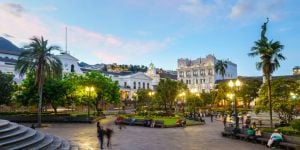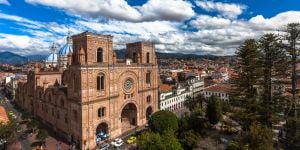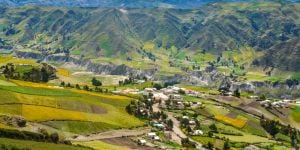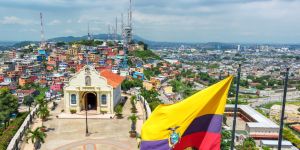My family and I are thinking highly about moving to Ecuador. Now I have a found a billion and one answers on the internet answering the questions all contradictory from one another so I'm turning to you the people that actually live there to give me the truths to the questions I seek 
1.) I have read that yes places take credit cards and no most places don't. Cash is the universal language. Do I go around carrying trash bags full of money guarding it with my trusty machete?
2.) Collecting Social Security and Pensions. What penalties will happen to these if I plan to live Ecuador till the end of my days?
3.) Do I need duel citizenship? Pro's for having it Con's for not having it? Is it necessary?
4.) Health Care (lets exclude dental care) I have found various information but nothing clear cut. If someone can shed some light on this I would greatly be appreciated. Some examples lets say I have a heart attack and I have IESS how much does it cost me (65 or older), or I develop a long term illness such as Parkinson's or Alheimers, or something that requires long term care or permanent hospitalization. What kind of costs am I looking at?
5.) Bouncing off #4 from what I read I just buy a property and live in the country for 9 months then some magical fairy comes along and dubs me as a Ecuadorian citizen and hands me my IESS insurance card?
6.) Is the IESS the best insurance I can obtain within Ecuador without paying huge premiums?
7.) Would I be eligible for Medicare if I retired there? Can I opt out of Medicare if I find the Ecuadorian Insurance better?
If you work through the past posts, a lot of these questions are answered in detail. But, here are few quick answers.
Question 1. You can easily withdraw money from an ATM with the only charge coming from your U.S. Bank. Ask your bank what they will charge. While I have not tried this, some have had great success using checks from U.S. banks for large purchases. Do not bring travelers checks. When you get permanent residency here (and a Cedula) you can open a bank account here and get a card. But, some banks will let you do this with just your Passport. In any case, you will have lots of options for dealing with the money issue, so this won't be a problem for you. Carrying a machete is probably not a good idea :-).
Question 2. I am not aware of any penalties. You can collect social security payments as an expat for as long as you live, however, SS will not deposit directly to a Ecuadorian bank (according to my inquiry two years ago; things can change). In other word, you will probably have to have your check deposited into a U.S. bank and withdraw it from there.
Question 3. Permanent residency is what it says, permanent, with some limits for time spent outside the country. Ninety days only for the first two years, a year and a half after that (according to the last time I looked; things do change). The choice of an Ecuadorian citizenship is yours to make after the required waiting period. Since these are brief answers, I won't go into the pros and cons. But, there is nothing immediately necessary about getting an Ecuadorian Citizenship, since your permanent residency gives you similar rights, including the right to vote. Please note that if you do get Ecuadorian citizenship and thus dual citizenship, you are still legally required to travel with both your American and your Ecuadorian passports.
Question 4. Can't really answer this since I have Tri-Care coverage from the U.S. and don't need additional insurance.
Question 5.I don't quite understand this question. If you are talking about a investment visa, then you will have permanent residency for as long as you keep that $25,000 in a qualifying investment/account here in Ecuador. Citizenship is a separate path open to permanent residence (and other categories of people) after they have lived here a specific, contiguous period of time. But, you must apply for this and pass the required tests. Citizenship is never automatic. The IESS card you will have to qualify for and then apply. No magical fairies, as far as I know, but if I meet one, I will have them contact you.
Question 6. Again, don't know much about this so I will remain silent on this issue.
Question 7. Medicare Part A is free. Part B costs about $104 per month on average, but is optional. So, you can elect to not have Part B coverage. However, neither Medicare part A or B cover expenses outside of the United States so neither will help you if you are here. You will need to find other insurance if you want coverage.












